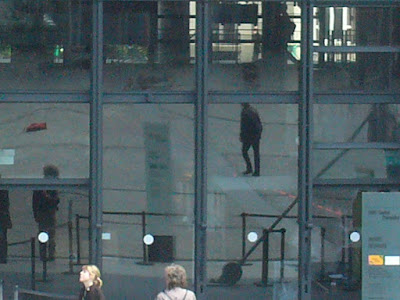"In proposing a tax-cut law last week, Finance Minister Christine Lagarde bluntly advised the French people to abandon their “old national habit.”
“France is a country that thinks,” she told the National Assembly. “There is hardly an ideology that we haven’t turned into a theory. We have in our libraries enough to talk about for centuries to come. This is why I would like to tell you: Enough thinking, already. Roll up your sleeves.”
Citing Alexis de Tocqueville’s “Democracy in America,” she said the French should work harder, earn more and be rewarded with lower taxes if they get rich."
It goes well with this from London a few weeks ago
"For almost the first time in two centuries, there is no eminent British poet, playwright or novelist prepared to question the foundations of the western way of life. One might make an honourable exception of Harold Pinter, who has wisely decided that being a champagne socialist is better than being no socialist at all; but his most explicitly political work is also his most artistically dreary."
And is a contrast to this:
"...Besides Clinton and McCain, Gov. Bill Richardson (D) of New Mexico, former senator John Edwards (D-N.C.), Rep. Ron Paul (R-Tex.) and New York Mayor Michael R. Bloomberg, a possible independent candidate, have come to Mountain View to take a closer look at a corporate culture that is the epitome of Silicon Valley self-confidence and innovation.
Eric Schmidt, Google's chief executive, called the question-and-answer sessions "a job interview with the American people."
"And you're also sort of interviewing with Google," Schmidt told McCain at a packed town hall meeting. "It's hard to get a job at Google."..."
And:
"Google has become a symbolic firm, as GM might have been in the 1930s and 1940s and IBM in the 1950s and '60s. . . . They're about sharing. Being open. Transparency. How that will transform politics as we know it, we'll have to see," said Fred Turner, author of "From Counterculture to Cyberculture: Stewart Brand, the Whole Earth Network and the Rise of Digital Utopianism" and an assistant professor at Stanford University.
"A visit to Google, in a way, is like stopping by the Internet of today. When you visit Google, you're respecting that sensibility and showing your alliance with it."


